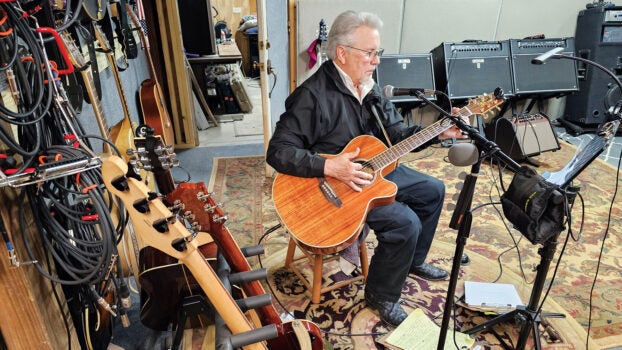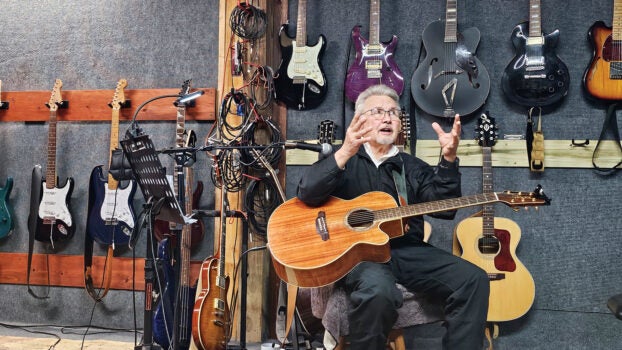‘In love with this’: Former lawman returns to life of music
Published 9:00 am Saturday, April 6, 2024
In spring 2021, Mike Campbell spent many of his days at the Lincoln County/ Brookhaven Government Complex, dressed in his Sheriff’s Deputy uniform and keeping the public and government employees safe. In the evenings, he was busy converting his workshop into a private recording studio, complete with drum kit, keyboard, bass guitar, and multiple acoustic and electric guitars.
Since he retired in June 2021 — after 13 years with the Sheriff’s Office and eight in the courthouse — that studio is where he loves to spend a large portion of his time.
Campbell has worn many hats across his 72 years — professional musician, respiratory therapist, soldier, law enforcement officer, paramedic, firearms dealer — but underlying everything was what he calls his Scot-Irish “gift of gab,” and the drive to write songs.
Pads, binders, piles of paper and CDs in his East Lincoln studio contain a portion of those creations.
“I write about people and subjects that mean something to me,” he said. One of those people is his wife, Mary Farr Campbell, and a song he wrote for her is called “Look Over Your Shoulder.”
He plays the song on a flat-top six-string acoustic guitar, his unique finger picking/strumming method accompanying his bright voice. “You’re the prize,” he sings, promising he’ll always be as close to her as a look over her shoulder.
At age 5 he loved watching The Lawrence Welk Show with his mother. The show was filled with musical entertainment. She took him to someone to teach the boy guitar, but he was told his hands were just too small. So his mother bought him a drum kit. He learned to play that and the bass guitar, and when The Beatles appeared on The Ed Sullivan Show in the 1960s, he knew exactly what he wanted to do with his life. As a teen, he was able to briefly meet rock guitar legend Jimi Hendrix at City Park Stadium in New Orleans — an amazing experience.
“It’s all I ever wanted to do. Still is now, and here I am now.”
He’s been writing songs since 1985, after he had moved from his native New Orleans to California and was part of a band there.
“But I came to Christ in L.A., and I had to leave those people and things,” Campbell said. The bad influences were “everywhere.”
So he decided to give another musical city a try, and relocated to Nashville. But the promoters and other influences were pretty much the same as the ones he’d tried to leave behind, so back to New Orleans it was.
There, he studied to become a respiratory therapist, and raised a family. As the years passed, he continued to leave the music life behind him. Until one day, his doctor brother sent him a gift — a Les Paul electric guitar and a Fender amp.
“You need to start getting back into music,” his brother said.
“So I did,” Campbell said. “I am absolutely in love with this.”
After the 2020 pandemic, he was very sick for a while and spent hours upon hours in his studio, playing, writing and praying. It moved him to compose a song on the keyboards, “When I Cross the River,” about coming to terms with his own mortality.
Campbell also recently wrote a song for his son Thomas, who recently got back to the States from an Army tour in Afghanistan. “A Clear Night Sky” is written from his son’s point of view, observing and absorbing the beauty of the desert at night.
All of his songs are originals, and when he has opportunity to play at festivals or venues he loves to share what he’s written. He lives for his God and his family — including two daughters and a couple of granddaughters — but music is always there, underlying everything.
Anything can become song, like a visit back to the New Orleans neighborhood where he grew up, playing with his sister and five brothers.
“Someone painted the old front door. What that color is, I’m not quite sure,” he sang. Looking at “an old photograph of my brother and me,” he wrote that as for “the past, you just can’t get there from here.”
Campbell takes a sip of tea from his mug with a caricature of the TV detective Columbo on the side, and selects a 12-string acoustic guitar from the wall of the studio.
The strings create a chorus as he plays and sings in agreement with the writer of the biblical book of Ecclesiastes, that all is vanity.
“So much for the brilliance we confer on ourselves, document our achievements in books, put them high on our shelves … all is vanity, vanity.”
Clothed in black pants, black pullover, black watch, black-rimmed glasses and black ostrich boots, his gray-white hair and goatee match his starched collar shirt peeking from under the pullover. Campbell continues to write and perform, hoping to do so as long as God allows.
“Time will come … we will fly … into the hands of God.”







